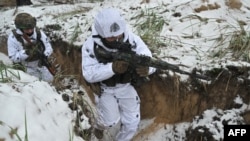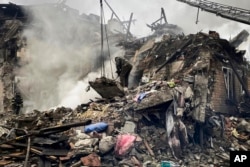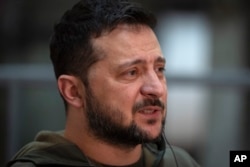Congress should act swiftly to provide aid to Ukraine before the end of the month, after which it will become exceedingly difficult to provide Kyiv with the assistance it needs, White House National Security Council spokesperson John Kirby said Friday.
"We need that assistance immediately so we can provide them assistance in an uninterrupted way," Kirby said during a news briefing.
He said the U.S expected Russia to try to destroy Ukraine’s critical energy infrastructure this winter like it did last year.
Ukrainian President Volodymyr Zelenskyy said he met with his military command Friday to discuss ways to produce "concrete results" next year in Ukraine’s war against Russia.
In his nightly video address, he spoke about improvements in mobilization methods.
"This is not simply a question of numbers, of who can be mobilized," he said. "It's a question of a time frame for each person who is now in the military, for demobilization and for those who will join the military. And it's about conditions."
He said these issues had to be examined by commanders and the defense ministry.
"There were several proposals today, and I am awaiting comprehensive solutions," he said.
Russian troops
Zelenskyy’s comments came as Russian President Vladimir Putin signed a decree increasing the number of service members in the Russian armed forces by 170,000 people, to a total of 1,320,000, the Kremlin and the defense ministry said Friday.
"The increase in the full-time strength of the armed forces is due to the growing threats to our country associated with the special military operation and the ongoing expansion of NATO," the Russian defense ministry said.
The ministry also said that it had no plans to significantly increase conscription or carry out a new wave of mobilization and that the increase in the number of service members would happen gradually by recruiting more volunteers.
Former Russian President Dmitry Medvedev, now deputy chairman of Russia's Security Council, said Friday that more than 452,000 people were recruited to the Russian military under contract from January 1 to December 1, 2023.
The wives of deployed Russian soldiers are not happy with their spouses’ “indefinite mobilization” and have expressed their dismay in public protests and online. The British Defense Ministry said Saturday in its daily report on Ukraine that Russian authorities are attempting “to quash public dissent” by paying the women off and discrediting them online.
Russian officials are “likely particularly sensitive,” the report said, to any protests about troops who have been mobilized since September 2022 and on the front line for more than a year.
Euronews reported Friday that a challenge Russian soldiers are currently facing in combat could also easily become a challenge for Ukrainian troops too.
Tyler Kustra, a University of Nottingham assistant professor of politics and international relations, told Euronews that the recent posting on social media of photographs of rats “the size of a Kalashnikov assault rifle” on the front line of Russian fighting in eastern Ukraine could also become a problem for the Ukrainian soldiers, as temperatures plunge.
Russia’s soldiers “are dealing with a severe rodent infestation as mice and rats seek warmth and food by going into [the soldiers’] trenches,” Kustra said.
It is a short walk for the rodents to also seek warmth and food among the Ukrainian soldiers who are just a short distance away, Kustra warned. “I worry that Putin isn’t the only vermin” that Ukrainian soldiers will have to deal with, he said.
Western aid
Ukraine is dealing with headwinds over the support it needs from the West in its fight against Russia. Zelenskyy said he was concerned the Israel-Hamas war would overshadow his country's battle.
In an exclusive interview with The Associated Press, he said the Hamas-Israel war could draw away not only attention but also resources from Ukraine as it fights to beat back the Russian invasion.
“Attention equals help. No attention will mean no help,” the president said. “We fight for every bit of attention.”
A recent AP poll indicated that almost half of Americans thought Ukraine was already receiving too much U.S. money.
The Ukrainian president said he realized Americans were facing a tough choice on Ukraine, but he told AP the consequences of Americans not supporting Ukraine could be harsh and could lead to U.S. forces being deployed to Europe. Without U.S. support, Zelenskyy said, “Russia will most likely invade NATO countries, and then the American children will fight.”
European Union leaders may not reach a consensus on a proposal to grant Ukraine 50 billion euros ($55 billion) in aid through 2027. It is going to be "very difficult" to agree at a December 14-15 summit of European Union leaders, a senior official with the bloc said Friday.
The senior official, who is involved in preparing the summit and spoke to Reuters on condition of anonymity, said the EU was still committed to supporting Ukraine, suggesting some assistance could be expected even if the 50 billion-euro plan fell through.
Trucker protests
Protests by Polish truckers over what they see as unfair trade competition from their Ukrainian peers continued at four border crossings. Slovak truckers have joined in the protests blocking the main crossing of Ukrainian goods from Ukraine to Slovakia.
Ukraine’s finance ministry put out data that showed the country's customs service had missed its planned revenues for November by 78%, or $255 million, an apparent consequence of the protests.
Ukraine’s economy minister posted data on the X platform that showed the tonnage of cargoes exported from Ukraine through Poland in November was down 39.3% from October.
A Ukrainian senior official said Thursday that the protests would reduce the country's overall imports by about a fifth in November and could cost 1 percentage point of GDP growth if they dragged on.
Polish and Slovak truckers are demanding that the EU reintroduce a permit system for Ukrainian competitors.
Train explosions
Ukraine’s domestic spy agency has carried out two successive train explosions on a Russian railway line deep in Siberia, the second attack this week on military supply routes in the area, a Ukrainian source told Reuters on Friday.
The incidents appeared to show Kyiv's readiness and ability to conduct sabotage attacks deep inside Russia and disrupt Russian logistics far from the front lines of Moscow's 21-month-old war in Ukraine.
The source, who declined to be identified, said the explosives were detonated as a freight train crossed the Chertov Bridge in Siberia's Buryatia region, which borders Mongolia and is thousands of kilometers from Ukraine.
The train had been using a backup railway line after an attack on a nearby tunnel a day earlier caused trains to be diverted, the source said.
Some information for this report came from The Associated Press, Agence France-Presse and Reuters.








